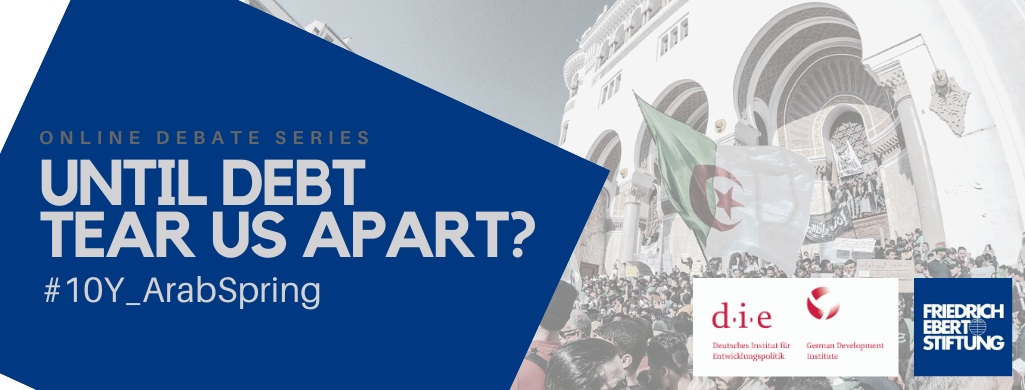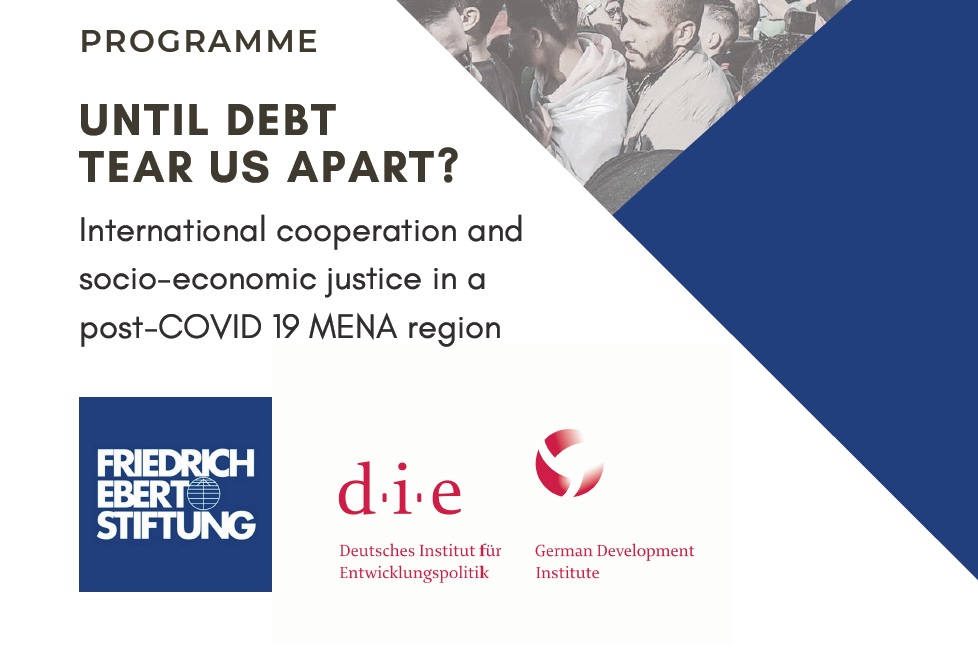Online Debate Series - Until debt tear us apart? #10Y_ArabSpring

Until debt tear us apart? International cooperation and socio-economic justice in a post-Covid19 MENA region
Tuesday, 22 September – 13 October 2020, 09:00-10:30 (NYC, Washington, DC) /14:00-15:30 CET (Tunisia) / 15:00-16:30 CEST/EET (Berlin, Brussels, Cairo) / 16:00-17:30 EEST (Amman, Beirut).
Overview:
The Friedrich Ebert Foundation and the German Development Institute are co-organising a series of online debates in the Autumn of 2020. Due to the Covid-19 pandemic, the question of how international partners can best support MENA countries and the region as a whole in addressing questions of social and economic justice has become more urgent. Even before lockdown, protests against perceived socio-economic injustices including poverty, corruption and cronyism, had erupted in Lebanon, Iraq, Algeria, Tunisia and Jordan, raising the prospect of a second wave of uprisings a decade after the ‘Arab Spring’. Concerns about socio-economic justice have prompted the Egyptian and Moroccan governments to start discussing issues like exclusion and regional inequalities, and to propose new development strategies. In Libya, Syria and Yemen, the three MENA countries most deeply affected by internationalised civil war, discussions of reconstruction, even before the conflicts are settled, have been influenced by the interests of foreign powers, rather than the people of the countries concerned.
For international development actors, such as the international financial institutions, the EU and Germany, the challenges of providing support for socio-economic justice in the MENA in line with agreed development cooperation principles have grown even greater amid the Covid-19 pandemic. The deep recession is likely to further weaken the ability of MENA governments to deliver on their social contracts by providing public goods and services. It is also likely to have long-term effects on important foreign exchange earners such as tourism or remittances from outside the region and to further accentuate vulnerability among informal workers. There is also the prospect that the pandemic may weaken support in Europe for cooperation itself, by increasing fear and further tightening borders.
In this online debate series, the Friedrich Ebert Foundation and the German Development Institute invite experts to discuss how international development partners best support MENA countries in their recoveries from the Covid-19 pandemic and other challenges to socio-economic justice. The World Bank, the EU and Germany have all adjusted their priorities and in some cases launched new strategies and instruments, but are these targeting the right areas, and do they provide support for socio-economic justice in MENA countries?
1. Arsonists as firefighters? Financial crisis in post-COVID MENA and the role of IFIs
22. September 2020, 09:00-10:30 (NYC, Washington, DC) / 14:00-15:30 CET (Algier, Tunis, Rabat) / 15:00-16:30 CEST/EET (Berlin, Brussels, Cairo) / 16:00-17:30 EEST (Amman, Beirut)
As architects of the globalized world, international financial institutions (IFIs) - particularly the International Monetary Fund (IMF) and the World Bank - exert varying degrees of influence over economic policy in the MENA region. They have intervened to address economic crises since the 1960s, promoting a deregulated, private sector-led, and integrated global market in exchange for technical assistance, loans, or financial surveillance. Around a decade after the 2008 financial crisis and 2011 Arab uprisings, an appraisal of this approach is due: What have the IMF, the World Bank, and other IFIs accomplished? Have their recommendations shifted the economic outlook in the region? And if so in what way? Such a discussion is even more relevant in the light of the global Covid19-crisis, as, as MENA countries are expecting the worst economic downturn since independence and many find themselves in the midst of a fiscal crisis. The importance of this historical moment cannot be clearer: Will the crisis enable a new, more inclusive and just economic system, or could the economic shock further exacerbate previous injustices and structural imbalances? What role should the IFIs play in the mitigation of its socio-economic impacts? And how have structural adjustments and years of IFI-inspired and induced policies predisposed different countries in the region to confront and contain the Coronavirus?
Introduction to debates series and presentation of FES IFI study: Thomas Claes, Project Director „Economic Policies for Social Justice”, Friedrich-Ebert Stiftung
Moderators: Amirah El Haddad, DIE / Thomas Claes, FES
Speakers:
Amr Adly, Assistant Professor, American University Cairo
Bessma Momani, Professor of Political Science, University of Waterloo
Ahmed Galal, Chairman of the Board of the MENA Health Policy Forum
2. Economic reforms as an opportunity: A post-COVID social contract for the region?
29 September 2020, 09:00-10:30 (NYC, Washington DC) / 14:00-15:30 CET (Algier, Tunis, Rabat) / 15:00-16:30 CEST/EET (Berlin, Brussels, Cairo) / 16:00-17:30 EEST (Amman, Beirut)
The Covid-19 pandemic has endangered fragile social contracts across the MENA region. The sharp economic downturn caused by the pandemic has reduced state revenues and had severe impacts on both formal and informal economic sectors. The demand for social protection has increased just as governments’ abilities to deliver has been undermined. This could have a major impact on social contracts in many MENA countries, which are based on state provision of welfare, jobs and subsidies in return for the loyalty of citizens. This kind of social contract has of course been under major pressure for many years, and its weaknesses were exposed during the Arab Uprisings a decade ago. What impact is the pandemic having on economic reform efforts in the MENA region? How can MENA governments build on successful responses to the Covid-19 pandemic to create a compromise that shares the burden of economic reform between major political actors and interest groups? Are new windows of opportunity for international support for reforms opening? What can external partners offer, in concrete terms, to support the emergence of new social contracts in key MENA countries?
Moderators: Markus Loewe, DIE / Henrik Meyer, FES
Speakers:
Ayat Soliman, MENA Regional Director for Sustainable Development, World Bank
Hans Frühauf, MENA Regional Director, GIZ
Mustapha Nabli, Independent Consultant and CEO, North Africa Bureau of Economic Studies, former Governor, Central Bank of Tunisia
3. Protest potentials in post-COVID Mena: A third wave of the Arab Spring?
6 October 2020, 09:00-10:30 (NYC, Washington, DC) / 14:00-15:30 CET (Algier, Tunis, Rabat) / 15:00-16:30 CEST/EET (Berlin, Brussels, Cairo) / 16:00-17:30 EEST (Amman, Beirut)
In the months prior to the Covid-19 crisis, mass protests in Algeria, Iraq, Lebanon and Sudan seemed to foreshadow a second Arab Spring. Persistent inequality and a series of events that visibilised the rampant state corruption had sparked widespread protests across the region. These protests demonstrated how a generation of young people without jobs and without the prospect of getting on in the world had lost faith in the political class. It is hard to see how the pandemic will do anything but reinforce this lack of trust. For the time being, corona has snuffed out mass demonstrations. Yet, as the virus is causing serious socio-economic disruption, it might stoke the region’s revolutionary flames soon again. Will the corona induced economic crisis thus mutate into a full-blown systemic crisis? Could the economic shock and the restrictive measures to control the spread of the virus even drive a “third wave of” the Arab Spring? Or will authorities seize the Covid-19 crisis as an opportunity to shore up their grip on power and suppress popular dissent? How has the pandemic affected social movements themselves and their abilities to make their claims heard through public protests? Finally, what can European decision-makers learn from past mistakes? After lacking the courage in 2011, how can Europa best support socio-economic and political participation in a post-COVID MENA-region?
Moderators: Jannis Julien Grimm, FES / Annabelle Houdret, DIE
Speakers:
Rima Majed, Assistant Professor of Sociology, American University of Beirut
Amel Boubekeur, Visiting Fellow, European Council on Foreign Relations
Irene Weipert-Fenner, Senior Researcher, Peace Research Institute Frankfurt
4. Those who do not learn from the past are condemned to repeat it: Europe’s role in post-COVID MENA
13 October 2020, 09:00-10:30 (NYC, Washington, DC) / 14:00-15:30 CET (Algier, Tunis, Rabat) / 15:00-16:30 CEST/EET (Berlin, Brussels, Cairo) / 16:00-17:30 EEST (Amman, Beirut)
The Covid-19 Pandemic has increased socio-economic vulnerability, with the potential to undermine social justice and peace across the MENA. Whether this results in increased pressure on Europe’s border security, asylum and health systems is unclear, but the demand for Europe to act in support of vulnerable communities in MENA countries is in any case likely to grow. The EU’s long-standing interest in regional stability in its ‘southern neighbourhood’ has traditionally been a powerful driver of its support for economic and political reform in the region. The perception that unrest in the region poses a threat to Europe’s security has, however, reduced Europe’s appetite for taking risks in support of change, and European policies have helped entrench the socio-economic and political status quo. Does the Covid-19 pandemic require a re-think of EU cooperation in the region? Have windows of opportunity opened, for different approaches? How might the EU best contribute to socio-economic justice and peace in a ‘post-Covid’ MENA?
Moderators: Mark Furness, DIE / Thomas Claes, FES
Speakers:
Ibrahim Saif, CEO, Jordan Strategy Forum / Former Minister for Planning and International Cooperation, Jordan
Dania Koleilat Khatib, Director, Research Center for Reconciliation and Peacebuilding, Lebanon
Sven Kühn von Burgsdorff, EU Ambassador to the Palestinian Territories


